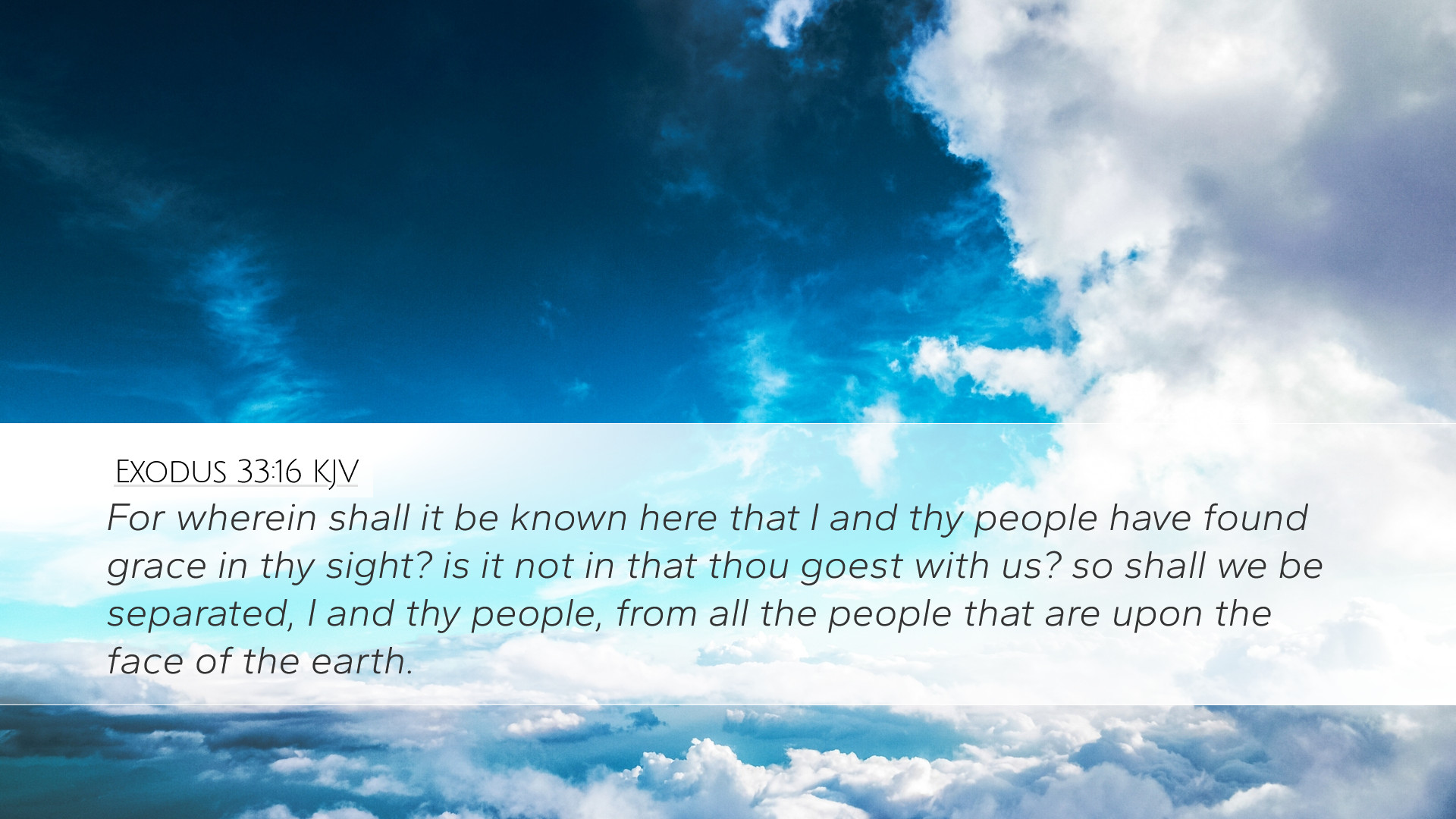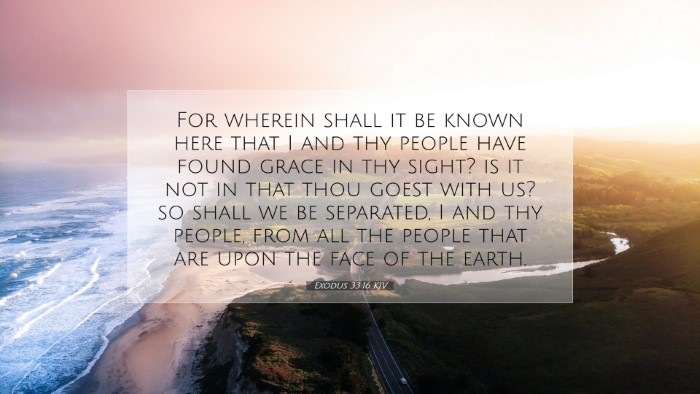Commentary on Exodus 33:16
Bible Verse: "For how shall it be known that I and thy people have found grace in thy sight? Is it not in that thou goest with us? So shall we be separated, I and thy people, from all the people that are upon the face of the earth." - Exodus 33:16
Introduction
This verse encapsulates a crucial moment in the narrative of the Exodus, reflecting Moses' deep concern for the relationship between God and Israel. It illustrates the importance of divine presence as a distinguishing factor that sets God's people apart from others. The ensuing commentary will draw from the rich insights of several public domain commentaries to provide a comprehensive understanding of this significant passage.
Moses’ Plea and Its Context
Moses, as the mediator between God and Israel, raises a pivotal question in this verse, emphasizing that without God's presence, Israel cannot claim any unique identity or grace before other nations. This moment occurs after Israel's sin of idolatry, in which the golden calf incident raised questions about God's commitment to His people.
- Matthew Henry: Henry emphasizes that the knowledge of grace is inextricably linked with the presence of God. He posits that Moses understood that God's favor is not merely about reinstatement post-failure but is deeply tied to the ongoing relationship with Him.
- Albert Barnes: Barnes notes that Moses’ inquiry about grace reveals a profound theological understanding: the notion that the divine favor is evident and experienced through relationship, leading to separation from the world’s values and practices.
- Adam Clarke: Clarke highlights Moses' existential angst—he understands that the people of Israel are not merely a numerical quantity but a community defined by divine association, underscoring the significance of God’s presence as the very essence of their identity.
The Role of Divine Presence
The crux of this passage is the necessity of God's presence. The assertion that God’s going with the Israelites signifies grace can be understood in multiple dimensions:
- Covenantal Relationship: The presence of God is rooted in His covenantal promises. As Barnes elaborates, for Israel, being chosen by God meant living in consistency with His will, which is highlighted through the abiding presence of God in their midst.
- Identity Formation: Henry indicates that the identity of God's people is shaped not just by law but by an attuned relationship with the divine. They are to be a "kingdom of priests" distinguished by their communion with God.
- Transformation and Holiness: Clarke points out that God’s presence brings the transformative reality that sanctifies and delineates His people from others. It is this holiness that makes them distinct in character and practice.
Separation from Other Nations
Moses articulates that the knowledge of grace leads to separation, a theme vital in both the Old and New Testaments. God’s choosing and residing among His people not only sets them apart but prepares them to fulfill His purpose in the world.
- Mission and Witness: As clarified by Henry, this separation is not for isolation but for the sake of being a witness. Israel’s distinctiveness enhances their calling to be a light to the nations, a theme echoed in both Testaments.
- Consequences of Sin: Barnes reflects on how the sin of Israel could jeopardize this separation. The golden calf incident threatened to dissolve their unique status, reinforcing the need for continual divine presence.
- Empowerment for Obedience: Clarke emphasizes that this distinct separation implies responsibility; Israel is called not only to be different but to demonstrate God's righteousness and justice, which requires God’s power and guidance.
Theological Implications
The theological implications of Exodus 33:16 resonate with important doctrines for modern believers:
- Grace and Dependence: The inquiry into grace speaks to a universal human condition—the need for divine help. As pastors and theologians reflect on this passage, they are reminded that grace is encountered in God’s nearness.
- Community and Identity: Students of theology will appreciate the communal aspect of grace; it is not merely an individual experience but a shared identity reflecting in community dynamics.
- Presence in Worship: The significance of God's presence remains crucial in worship settings, reinforcing that for effective ministry, congregations must cultivate environments where they consciously seek the active presence of God.
Conclusion
Exodus 33:16 serves as a profound reminder of the vital role God's presence plays in shaping the identity and mission of His people. Through the combined insights from esteemed commentators, we observe that grace is not a static status but an active relationship that defines believers in every generation. For pastors, students, and theologians alike, understanding this passage fosters a greater appreciation for the relational dynamics of faith, underscoring the ongoing need for divine presence in the life of the church and the individual believer.


